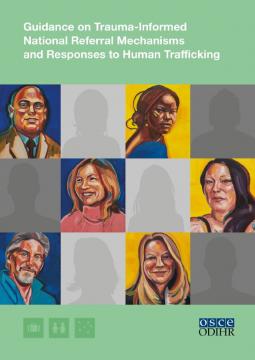Resources
Guidance on Trauma-Informed National Referral Mechanisms and Responses to Human Trafficking

Survivors need to have confidence in the systems designed to identify and protect them, to give them the best chance of accessing services, staying with them and remaining safe. Therefore, NRMs should provide a structural set up for trauma-informed frameworks and procedures, and function as a natural ‘home’ for professional, trauma-informed methods of working. NRMs must ensure respect for the human rights and dignity of all adults and children who are victims of trafficking. There should be clear recognition in anti-trafficking law, policy and related guidance — and therefore recognition across all relevant NRM sectors and by all service providers — that victims of human trafficking should be treated as a distinct category of vulnerable people in need.
This Guidance is part of the ODIHR series deriving from the National Referral Mechanisms Handbook (2nd Edition): National Referral Mechanisms: Joining Efforts to Protect the Rights of Trafficked Persons. It summarizes why National Referral Mechanisms (NRMs) need to be trauma-informed, makes the case for trauma-informed methods of working, and provides recommendations for participating States, examples of promising practices and useful resources.
The views, opinions, conclusions and other information expressed in this document are not given nor necessarily endorsed by the Organization for Security and Co-operation in Europe (OSCE) unless the OSCE is explicitly defined as the Author of this document.
